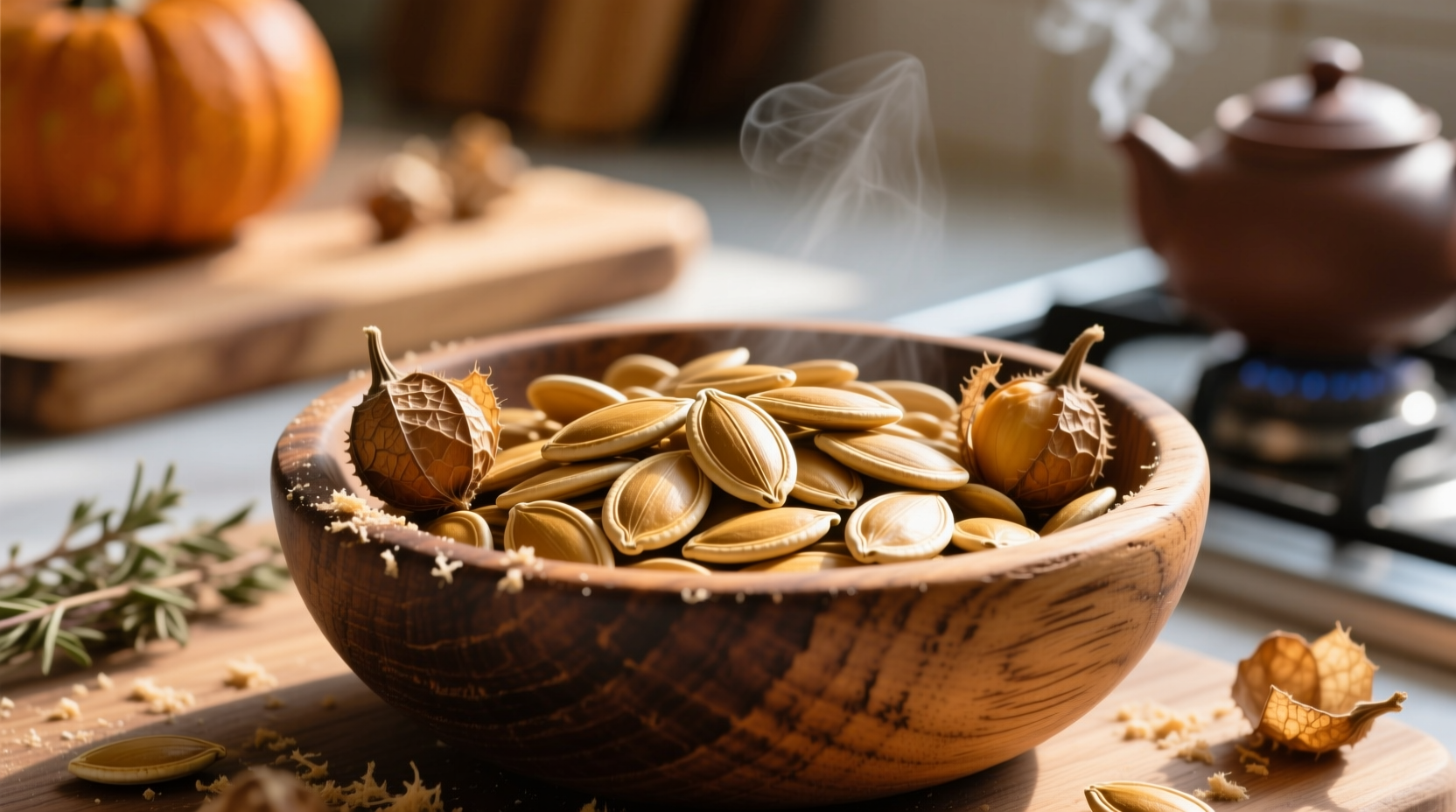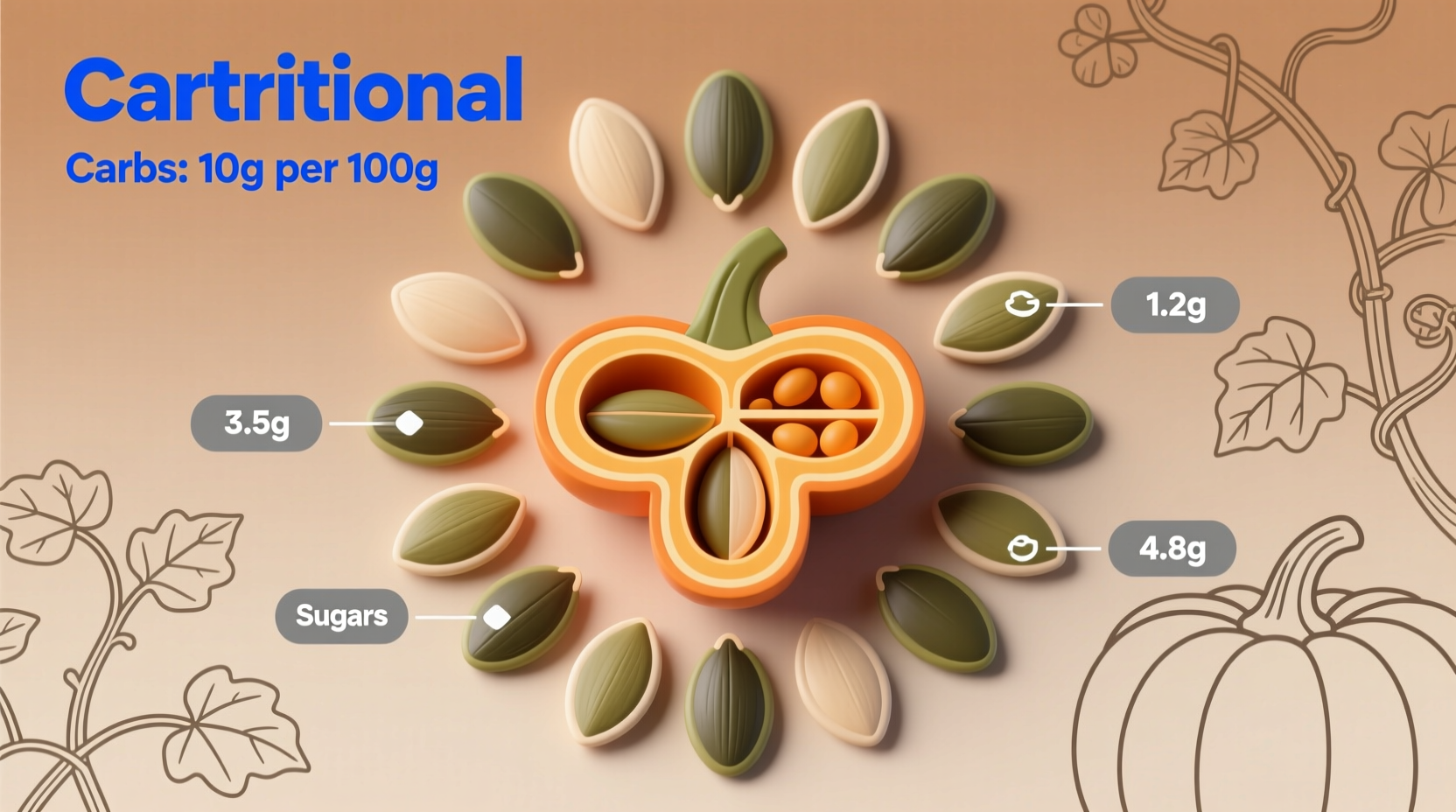One ounce (28g) of raw pumpkin seeds contains approximately 5 grams of total carbohydrates, with 1.7 grams of dietary fiber, resulting in about 3.3 grams of net carbs. This makes pumpkin seeds a relatively low-carb snack option compared to many other plant-based foods.
When you're tracking your carbohydrate intake for health or dietary reasons, understanding the precise nutritional profile of foods like pumpkin seeds becomes essential. As a food science specialist with experience in ingredient composition analysis, I've examined how these crunchy kernels fit into various eating patterns. Pumpkin seeds offer more than just basic nutrition—they provide a balanced carb profile that works well for many dietary approaches when consumed in appropriate portions.
Breaking Down the Carbohydrate Content
Let's examine the specific carbohydrate components in pumpkin seeds. According to the USDA FoodData Central database, a standard 1-ounce (28g) serving of raw pumpkin seeds contains:
| Carbohydrate Type | Amount per 1 oz (28g) | % Daily Value* |
|---|---|---|
| Total Carbohydrates | 5.0g | 2% |
| Dietary Fiber | 1.7g | 6% |
| Sugars | 0.3g | - |
| Net Carbs | 3.3g | - |
*Percent Daily Values are based on a 2,000 calorie diet. Your daily values may be higher or lower depending on your calorie needs.
This nutritional breakdown reveals why pumpkin seeds stand out among snack options. The majority of their carbohydrates come from fiber rather than sugars, with minimal natural sugars present. This composition contributes to their low glycemic impact, making them suitable for blood sugar management when consumed in appropriate portions.
How Pumpkin Seeds Compare to Other Popular Seeds and Nuts
Understanding where pumpkin seeds fall on the carbohydrate spectrum compared to similar foods helps put their nutritional value in context. The following comparison shows how various seeds and nuts measure up in terms of carb content per ounce:
| Food Item | Total Carbs (per oz) | Fiber (per oz) | Net Carbs (per oz) |
|---|---|---|---|
| Pumpkin seeds | 5.0g | 1.7g | 3.3g |
| Chia seeds | 12.0g | 10.0g | 2.0g |
| Flax seeds | 8.0g | 7.0g | 1.0g |
| Almonds | 6.0g | 3.5g | 2.5g |
| Walnuts | 4.0g | 2.0g | 2.0g |
| Sunflower seeds | 6.5g | 3.0g | 3.5g |
This comparison, sourced from the USDA National Nutrient Database, demonstrates that pumpkin seeds sit in the middle range for total carbohydrates among common seeds and nuts. What makes them particularly valuable is their favorable fiber-to-total-carb ratio, which contributes to their slower digestion and more stable blood sugar response.
Practical Applications for Different Dietary Needs
Understanding the context in which pumpkin seeds work best for various eating patterns is crucial for making informed dietary choices. The carbohydrate content affects their suitability differently depending on your nutritional goals:
For Low-Carb and Keto Dieters
With approximately 3.3 grams of net carbs per ounce, pumpkin seeds can fit within a standard ketogenic diet (<50g net carbs daily) when consumed in moderation. A small handful (about 15-20 seeds) provides minimal carb impact while delivering healthy fats and magnesium. However, keto dieters should be mindful of portion sizes, as larger servings could potentially disrupt ketosis.
For Blood Sugar Management
Research published in the Journal of Medicinal Food indicates that pumpkin seeds may help improve insulin regulation due to their magnesium content. The low sugar content (only 0.3g per ounce) combined with fiber makes them a smart snack choice for those managing blood glucose levels. The American Diabetes Association recognizes pumpkin seeds as a diabetes-friendly food when consumed in appropriate portions.
Dietary Limitations to Consider
While generally well-tolerated, pumpkin seeds may present challenges for certain dietary approaches. Those following extremely low-carb protocols (<20g net carbs daily) should limit intake to very small portions. Individuals with FODMAP sensitivities may experience digestive discomfort from larger servings due to the fiber content. Always consult with a registered dietitian to determine appropriate portions based on your specific health needs and goals.

Maximizing Nutritional Benefits While Managing Carbs
How you prepare and consume pumpkin seeds affects their nutritional profile and carb impact. Here are practical strategies to get the most from this nutrient-dense food:
- Portion control matters: Measure servings rather than eating directly from the bag. A single serving is 1 ounce (about 85 seeds) or 1/4 cup.
- Pair with protein: Combine pumpkin seeds with protein sources like Greek yogurt or cottage cheese to further slow carbohydrate absorption.
- Choose raw over roasted: Raw pumpkin seeds typically contain no added sugars or starches that sometimes accompany commercial roasting processes.
- Timing considerations: Consume pumpkin seeds as part of a balanced meal rather than as a standalone snack to minimize blood sugar impact.
Beyond Carbohydrates: The Complete Nutritional Profile
While carb content is important, pumpkin seeds offer numerous other nutritional benefits that contribute to their status as a functional food. According to research from the Harvard T.H. Chan School of Public Health, pumpkin seeds are particularly rich in:
- Magnesium: One ounce provides about 19% of your daily needs, supporting muscle and nerve function
- Zinc: Approximately 14% of daily needs per ounce, crucial for immune function
- Healthy fats: Primarily unsaturated fats including omega-3 and omega-6 fatty acids
- Plant-based protein: 8.5 grams per ounce, making them a complete protein source
These additional nutrients work synergistically with the carbohydrate profile to create a nutritionally balanced food. The fiber content not only affects net carb calculations but also contributes to satiety and digestive health, potentially helping with weight management goals.
Common Questions About Pumpkin Seed Carbs
Based on frequent inquiries from readers tracking their carbohydrate intake, here are answers to the most common questions about pumpkin seeds and carbohydrates:











 浙公网安备
33010002000092号
浙公网安备
33010002000092号 浙B2-20120091-4
浙B2-20120091-4